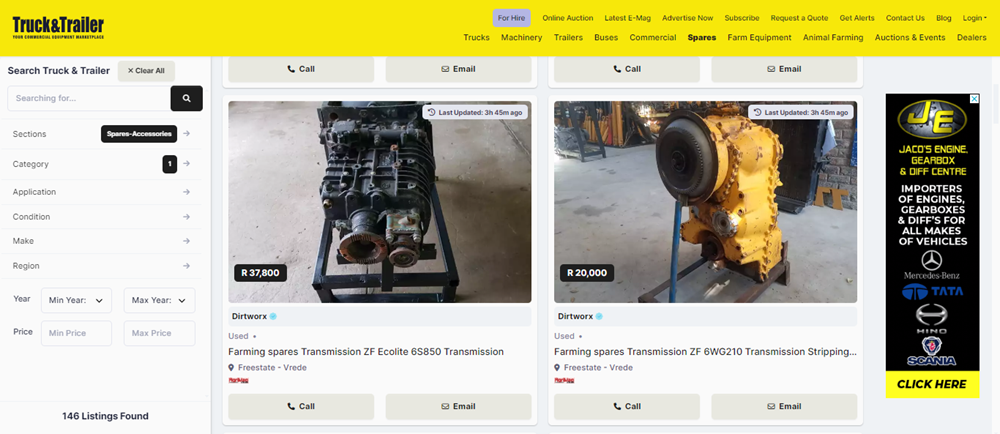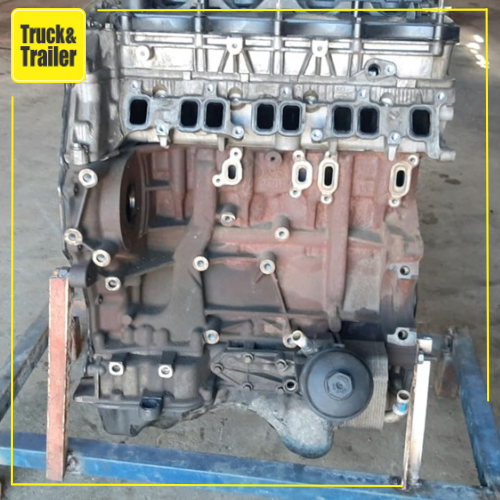Agricultural equipment forms the backbone of farming operations, facilitating efficiency and productivity in South Africa's agricultural sector. However, the wear and tear of daily use can lead to breakdowns and disruptions in farming activities. Implementing effective maintenance and repair strategies is essential to ensure the longevity and performance of agricultural machinery. In this article, we delve into the importance of repair strategies for farming equipment and provide insights into maximising efficiency through proper maintenance practices. As you strive to enhance the performance of your agricultural machinery, remember to explore Truck & Trailer for a diverse range of farming equipment for sale, catering to your specific needs and requirements.

Some Effective Maintenance and Repair Strategies for Farming Equipment
1. Regular Maintenance Practices:
Regular maintenance is crucial for preventing costly breakdowns and ensuring the smooth operation of agricultural equipment. Farmers should adhere to manufacturer-recommended maintenance schedules, which typically include tasks such as oil changes, filter replacements, lubrication, and inspection of critical components. By conducting routine maintenance checks, farmers can identify potential issues early on and address them before they escalate into major problems.
2. Training and Skill Development:
Proper training of farm workers in equipment operation and maintenance is essential for optimising performance and minimising the risk of damage. Investing in training programs helps workers understand the intricacies of different machinery and teaches them how to operate equipment safely and efficiently. Additionally, providing ongoing education opportunities enables workers to stay updated on the latest repair techniques and technologies, empowering them to address minor issues independently.
3. Utilisation of Technology:
Advancements in technology have revolutionised the agricultural industry, offering innovative solutions for equipment maintenance and repair. Farmers can leverage diagnostic tools, telematics systems, and predictive analytics to monitor the health of their machinery in real-time. These technologies enable early detection of potential problems, allowing farmers to take proactive measures to prevent breakdowns and minimise downtime. Moreover, digital platforms and mobile applications provide access to valuable resources, such as equipment manuals and troubleshooting guides, facilitating quick and efficient repairs.
4. Partnering with Reliable Suppliers:
Establishing partnerships with reputable suppliers and service providers is essential for ensuring access to quality parts and timely support. Collaborating with authorised dealerships and distributors ensures that farmers receive genuine replacement parts that are compatible with their equipment. Moreover, suppliers often offer maintenance contracts and support services, providing farmers with peace of mind and expert assistance when needed. Building strong relationships with suppliers fosters trust and reliability, which are invaluable assets in the agricultural sector.
5. Implementing Preventive Maintenance Programs:
Preventive maintenance programs involve proactively identifying and addressing potential issues before they cause equipment failure. By conducting regular inspections and implementing predictive maintenance techniques, farmers can anticipate component failures and schedule repairs during off-peak periods. Preventive maintenance not only minimises the risk of unexpected breakdowns but also extends the lifespan of agricultural equipment, maximising return on investment in the long run.
6. Environmental Considerations:
In addition to mechanical maintenance, it's essential to consider environmental factors that can impact the performance and longevity of farming equipment. South Africa's diverse climate and terrain pose unique challenges to farming machinery. Exposure to harsh weather conditions, such as extreme temperatures, humidity, and dust, can accelerate wear and corrosion. Therefore, storing equipment in a covered area when not in use and implementing proper cleaning procedures after each operation can help protect against environmental damage and extend the lifespan of machinery.

7. Monitoring Equipment Performance:
Regularly monitoring the performance metrics of agricultural equipment can provide valuable insights into its health and efficiency. Tracking parameters such as fuel consumption, engine hours, and operating temperatures can help identify deviations from normal operating conditions, indicating potential issues that require attention. Implementing a comprehensive equipment monitoring system allows farmers to make data-driven decisions regarding maintenance schedules, fuel efficiency optimisation, and equipment utilisation, ultimately enhancing overall farm productivity.
8. Emergency Repair Preparedness:
Despite proactive maintenance efforts, unexpected breakdowns can still occur, especially during critical periods such as planting and harvesting seasons. Therefore, it's essential for farmers to have contingency plans in place to address emergency repair situations swiftly and effectively. This includes maintaining a well-stocked inventory of spare parts, tools, and emergency repair kits on-site, as well as establishing commuhttps://www.truckandtrailer.co.za/farm-equipment-dealers/page2nication channels with local service providers and equipment dealerships for rapid assistance when needed.
9. Continuous Improvement:
The agricultural industry is constantly evolving, with new technologies and practices emerging to enhance efficiency and sustainability. Therefore, farmers should embrace a culture of continuous improvement and innovation in their maintenance and repair strategies for farming equipment. This involves staying abreast of industry trends, attending training workshops and seminars, and actively seeking feedback from equipment operators and maintenance personnel. By fostering a culture of learning and adaptation, farmers can identify opportunities for optimisation and implement innovative solutions to enhance equipment performance and resilience.
Overall, effective maintenance and repair strategies for farming equipment are paramount for ensuring reliability and performance. By prioritising regular maintenance practices, investing in training and skill development, leveraging technology, partnering with reliable suppliers, and implementing preventive maintenance programs, farmers can minimise downtime, reduce repair costs, and optimise productivity on the farm. As you embark on your journey to enhance the efficiency of your agricultural operations, remember to explore Truck & Trailer for a wide selection of farming equipment for sale, offering quality solutions to meet your needs.




